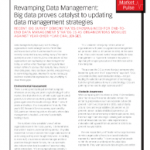No one knows for sure who coined the term Big Data.
Despite etymological studies, we are still no closer to attributing provenance to any one person, or indeed any one period. Some say the term was coined in the '80s, others believe the '90s – and many are convinced the term originated in the mid-2000s.
Confusion abounds, as is so often the way in data management circles. But the confusion doesn't end there. Many disagree on the definition of big data.
One thing we can all agree on is that big data is big news and has certainly captured attention at the board level.The problem, I firmly believe, is that big data is a poor term to use for capturing the attention of executives because it focuses too much on the how to the detriment of the why.
We read every day of organizations that are radically transforming their business models through data.
In the excellent 'Too Big to Ignore' by fellow Roundtable writer Phil Simon, we learn of several transformational case studies that companies such as Quantcast, Explorys and NASA have been on.
It is this transformation journey that I believe is downplayed by the term big data because, for many organizations, the "big" aspect of data is no longer relevant. They have overcome the volume, velocity and variety hurdles of working with big data. They have adapted to the modern architectures such as Hadoop and grid computing. These technologies are now simply business as usual.
So instead of using a largely technical term that focuses on the "how," shouldn't we be coining a phrase that is far more relevant to the board? The term big data barely hints at this transformational capability.
And don't get me started on the Internet of Things!
The deeper value behind big data
Big data is not simply about doing data analytics faster or finding more creative ways to pull in a wide variety of data to detect fraud, or pull in vast amounts of social media data in real time. Instead, what you are really doing is giving executives the ability to discover entirely new business models that can radically impact new or existing markets.
The danger for traditional organizations that remain steadfastly bound to a single business model ethos is that young startups, fueled with smarter data, inspired leadership and leaner operations, can seriously damage the status quo. One only has to look at the effect Amazon had on the traditional book publishing and distribution industry to see an example of this transformation.
But Amazon is just one success story. New case studies are presented every day that show time and time again that the bigger story of big data is this groundbreaking business model transformation.
In The New Oil, Arent van 't Spijker cites numerous cases where new business models have been designed on the back of rethinking the most critical asset that organizations possess – data.
Arent points out that the "...value [of a company such as Facebook]therefore is not so much in the functionality that these companies offer but in the data they generate through this functionality."

If companies look at their data through a more transformative lens, they can finally start to realize it as an asset on the balance sheet.
So, has big data had its day?
I'll let you share your views in the comments below. But if you agree that the term doesn't do the outcome any justice, then the challenge becomes what term should we replace it with?
A thought for another post, perhaps...






1 Comment
I think the term is fine... it is simple, catchy and reflects data that are eventually used in generating the application, solutions, insights... just compare it to other big names facebook, google, Amazon...
This is what I think, however big data fundamentals are already here to stay for any to catch, while changes in flavors happening.
Regards: Nihad K. Almahrooq